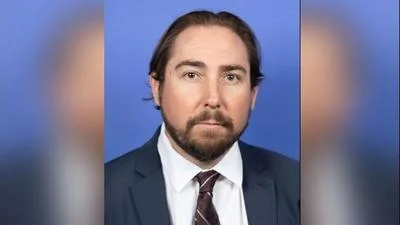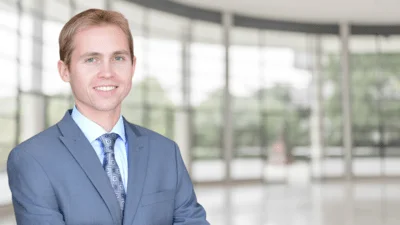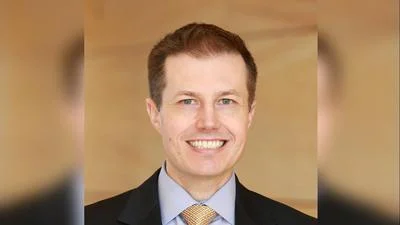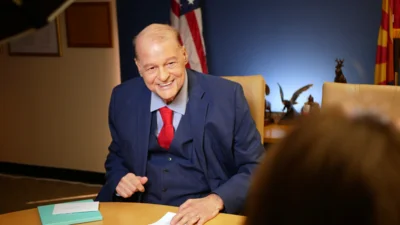Arizona State Sen. Janae Shamp (R-AZ-29) said illegal immigration has "become a humanitarian crisis" and the proposed Arizona border bill, which was supported by various law enforcement agencies on the state, was written to help the situation. She made the comments on a recent episode of the Grand Canyon Times podcast.
"The main meat of the bill is that it is against state law to enter Arizona from Mexico through any other way besides a lawful port of entry," Shamp said about Arizona House Bill 2060. "We want people to come here and if, if they're claiming asylum, please come through the port of entry and claim asylum, but we can't have women and children being trafficked."
"It's become a humanitarian crisis, and we need to make sure that we give the tools to law enforcement," Shamp told host Leyla Gulen. "That bill was 100 percent supported by all of the sheriffs. The Sheriff's Association came out very strong. The Border Patrol Union came out strong. And unfortunately, Katie Hobbs vetoed it."
Shamp joined the Grand Canyon Times Podcast to discuss border security, housing affordability, and healthcare in Arizona, as well as how she plans to outreach to young conservative voters in her district and her legislative priorities when re-elected.
Shamp was first elected to represent Arizona’s 29th Legislative District in Nov. 2022. She defeated Democrat David Raymer, winning 59 percent to Raymer’s 41 percent.
A resident of Surprise, Shamp graduated cum laude from Arizona State University and received her nursing degree, also graduating cum laude, from Grand Canyon University.
She is an operating room nurse, and said she was fired from her nursing position for refusing to take the “COVID” MRNA injection.
Arizona’s 29th Legislative District is entirely located within Maricopa County, west and northwest of Phoenix. The district stretches from Litchfield Park in the south to north of Morristown in the north, stopping to the east of Wickenburg. It includes Luke Air Force Base.
Grand Canyon Times podcast is available on Apple Podcasts and Spotify.
Below is a unedited transcript of the episode:
Leyla Gulen: [00:00:00] Welcome to the Grand Canyon Times podcast. I'm your host, Laila Ghulen. In this episode, we welcome our guest, State Senator Janae Shamp. Senator Shamp has called Arizona home for more than three decades. She's a pro life constitutional conservative, a rancher's wife, and registered nurse.
Senator Shamp became a public servant leader in 2022 and vows to continue to fight for the citizens of the great state of Arizona. Senator Shamp. Welcome.
Janae Shamp: Good morning. Thank you so much.
Leyla Gulen: Layla for having me on. Appreciate you taking the time. Former President Donald Trump endorsed you in your race to the state Senate two years ago, and you're back on the campaign trail working to keep that seat.
Let's start with what some of the most important issues are that you've been hearing from your constituents.
Janae Shamp: Layla, [00:01:00] when I've been out knocking doors, the number one concern is the border. Um, I have a lot of retired, uh, retired citizens in my district, and that is their number one concern. They're afraid for the safety of their neighborhoods.
They're afraid for the safety of their kids and their grandkids, especially the grandkids in school with some of the fentanyl deaths that we've had. And that seems to be the number one concern and their second concern is the economy and the fact that they live on fixed incomes and that they just can't afford the inflation that's happening to them.
Leyla Gulen: Yeah, of course, that's felt countrywide. But when we focus on the border issue, the border crisis, of course, Arizona feeling the heat from all of that. exponentially compared to some of the other states, despite what we've been hearing coming out of some of our states. They say every state is a border state, but Arizona truly is one.
So, uh, how, how have things been going in this last, let's just say in this last six months, [00:02:00]
Janae Shamp: the last six months, unfortunately, the rhetoric has gotten pretty ugly. And one thing about me is a little history. I'm a nurse. I'm an operating room nurse and I care about my patients and I care about my citizens of Arizona and when I ran for office, I ran because I believe that we need common sense approaches at the Capitol.
Um, I'm not much for bomb throwing or rhetoric. I'm about what is it that's broken and how can we fix it? You know, my experience as a perioperative nurse manager is to go in and identify policies that need changed or that need to be followed and adhere to more appropriately. And then it is, it's about making sure that this everyone has what they need from the surgeons to everyone in between.
And ensuring that we're all on the same page and that we're all [00:03:00] moving in the right direction. And I'm the person that went down to the Capitol with the mindset that I am going to work across the aisle. I am going to talk to people that think differently than me because I want to make sure That we're putting together the best solutions that we can put together for the citizens of Arizona.
You know, I, I believe one way and there's others across the aisle that believe another way and one could say that, um, there was a senator in, in, that is now running for city council and she was as, as far left as people say that I am far right. And her and I did a lot of work together. We did a lot of work together on making sure that we We're cutting red tape for housing.
Housing is a big issue. We have a lot of, um, a lot of kids that can't move out because they can't afford it. You know, I bought my first house at 23, 23 year olds today can't afford that. And so we did a lot of work across the aisle and I'm really proud of that. And I hope that that's what I hope that that's what the citizens of Arizona start [00:04:00] to see and that.
There's the rhetoric is not always as it appears, um, with every member of the state legislature. So you know, the last six months have been, you know, coming together with a budget. We were 1. 8 billion deficit that we needed to, um, we needed to navigate. And I'm very proud that we did not cut any K 12 spending.
Uh, we continued with school choice. We are making sure that the citizens of Arizona are feeling some relief with, uh, rental tax cuts and, um, just Doing the things that the people sent me down to do.
Leyla Gulen: Yeah, and I'm curious to know what the difference is between this race and your previous one. But since you had brought it up, affordable housing, education, uh, affordable healthcare, let's talk quickly about your opponent.
He's a young, 26 year old Eric Stafford. He's a vet tech and machinist, and he's running on the platform that [00:05:00] he hopes to reach the younger voter. Uh, you know, he falls into that category. over educated, underpaid, talking about unaffordable health care and housing. So what is your message to the young voter?
Janae Shamp: My message to the young voter is to mobilize and to vote for the people that are putting forward policies that are meant to help them and not the policies of the Kamala Harris administration that have put us in this situation.
Leyla Gulen: Yeah, and You know, do you find that you're able to reach those voters? Do you find that you're able to that your message resonates with them?
Have you received any feedback from those particular constituents?
Janae Shamp: I do. Yes, ma'am. Layla. I have a lot of constituents that their grandkids are coming to meet and greets in the retirement communities, and it makes me so proud that they're so actively involved. And they are concerned about the future.
They're concerned about being overeducated and underpaid. [00:06:00] And as you know, I think that all 30 somethings and below are facing right now. And so the policies that have gotten us here are the policies that we need to get away from. Um, we do not need more of those policies. And so we need to support candidates that are working for this.
Arizona, the individual citizens of Arizona, regardless of age.
Leyla Gulen: Yeah. Well, and it sounds like you've left, you know, very positive legacy so far. I want to jump back though. I'm talking a bit more about the border immigration issues, but also the legislation, HCR 2060. It stalled in the Senate last spring. Can you catch us up and tell us a little bit more about what it was supposed to achieve and why it's stalled and where it is now?
HCR
Janae Shamp: 2060, the border protection act.
Leyla Gulen: Yes.
Janae Shamp: That bill did not stall. Uh, that bill, what ended [00:07:00] up happening is, um, we put that bill on the governor's desk. That was the first bill that we put on the governor's desk last session. And it was, we were running a bill to protect the citizens of Arizona. And all it says is that, I mean, the main meat of the bill is that you, it is against state law.
To enter Arizona from Mexico through any other way besides a lawful port of entry. We just want people to come through the lawful port of entry. We want people to come here and if, if they're claiming asylum, please come through the port of entry and claim asylum. But we can't have women and children being trafficked.
You wouldn't believe the unfortunate and just absolutely gruesome things that I've seen in the operating room because of what's happening on the border and creating an environment that is luring people that are trying to come here for a better life. It's become a humanitarian crisis, and we [00:08:00] need to make sure that we give the tools to law enforcement.
That bill was 100 percent supported by all of the sheriffs. The Sheriff's Association came out very strong. The Border Patrol Union came out strong. And unfortunately, Katie Hobbs vetoed it. And it was very, very difficult. It was very partisan, um, in the, in the conversations on the floor of the house and the Senate, and, um, people wanted to make it about something that it wasn't, that it was about showing your papers.
Uh, that is not what this is about. Uh, this, the way the bill was written, the law enforcement have to have probable cause. Probable cause is very defined in statute. And so that is what we utilized. So unfortunately, since it was vetoed, that is when we put it as an HCR so that we could put it on the ballot for the citizens to decide.
Leyla Gulen: I see. Okay. And, you know, we hear a lot about the humanitarian [00:09:00] crisis, and you said you've seen it firsthand. It was out getting. You know, too terribly morbid, but can you paint us a picture so that people really, truly understand that, you know, humanitarian crisis, you can lump a lot of things under that umbrella.
No one quite knows exactly what that means, but since you've seen it firsthand, can you give us an example of what a humanitarian crisis looks like as it pertains to the illegal immigration that's been coming over our borders?
Janae Shamp: Well, I think that the number one thing that everyone is thinking about when I'm talking to voters is the 300, over 300, 000 missing children.
That should scare everyone. If that is not a humanitarian crisis, I don't know what is. Children are, where are they going? What is happening to them? There, there's, um, evidence of sex trafficking, labor trafficking. And that is another issue. That's another issue that were put it with the [00:10:00] Republicans at the legislature put on the ballot and Senator Bullock was key.
And that is, um, if you traffic a child across the border for sex. You go to prison for the rest of your life, natural life in prison. And that is something that seems to resonate with Democrat and Republican voters. And I'm very proud that, that we put that forward, that it will be on the ballot for the citizens of Arizona to decide upon.
That is, to me, it shouldn't hurt to be a child.
Leyla Gulen: That's right. That's right. And trying to get that message acknowledged, um, by, you know, Our Capitol, it seems to be a Herculean effort in doing so. But again, people will vote with their feet and you know, I think it's also important to, to focus on. What goals you have for the future and what you hope to achieve.
So if you should be reelected, Senator Champ, [00:11:00] what do you hope to achieve in your next two years as state senator representing district 29?
Janae Shamp: On the next two years, I hope to achieve some bipartisan work in the areas of healthcare, um, specifically with allowing for international physicians right now. Um, I've in my there's a little bit of history here.
I worked with a neurosurgeon from South Africa and it took him 10 years to become, um, a surgeon in the United States. And he was by far hands down the best neurosurgeon I've ever worked with. And he, he, he was an incredible, he still is an incredible physician. But the struggle that he went through, so I started asking others and, you know, I turned, it turns out I had an OR tech in one of my ORs that was a surgeon in his country.
And now he is an, Oh, he's a tech because he can't get into residency. And see, that's what the problem, the way that the laws are written now, They need to go through residency [00:12:00] and residency slots are hard to come by for our medical school graduates that are here in the United States. So I worked with the medical board.
I worked with the Physicians Association, the D. O. and M. D. both. And we came up with a really great plan. And it will, uh, It will help the rural areas the most by allowing for a physician. Now, of course, federal J one visas, all of that needs to be completed, but that's not where our, um, you know, where we lie with our statute, we need to make sure that we set it up so that they have the capability once they have the J one visa to work in the United States.
So what we did is we. shaped it to help the rural communities the most. And that legislation, um, was, it was only three votes shy in the house and it had to do with some personalities. So that is something that I'm very, very, I'm looking forward to running that bill again and helping because we have a physician crisis in Maricopa County [00:13:00] alone.
For primary care physicians, we're at a 264 percent deficit. So I don't know if you've tried to go and get a new primary care physician. There's not very many that are taking new patients.
Leyla Gulen: It's near impossible. It's near impossible. All over the country.
Janae Shamp: Yes, ma'am.
Leyla Gulen: Yes, ma'am. And, and it, it, I've never experienced in my life a problem like that.
And I thought maybe it could just be where, where I live at the time. But no, it just seems now across the board, it is near impossible. And doctors get up and leave and move to other places as well. So you had someone that you got used to for a while. I mean, I was a child and I had my primary care physician for as long as he was.
alive practically. It's not that way anymore. And there's a lot of red tape. There's a lot of bureaucracy that's involved in health care as well.
Janae Shamp: Yes, ma'am. Yes, ma'am. There is a lot. And, and [00:14:00] there's, there's ways to remove the red tape and enable, um, physicians to practice. And so international physicians will be one bill that we'll put forward.
Um, I've also been working with the naturopaths, the nurse practitioners. So we're trying to think outside the box. Um, we're trying to, if we're, if residency is going to create an issue where we, we only have so many slots, well then, how do we add more slots? The government has always been the one that has been in, in, quote unquote, in charge of the residency slots per state, by state.
So, how can we think outside the box and what can we do differently? And a lot of the times that's, that's where I am and that is questioning the status quo and what can we do to change. So let's all come together. Um, I had a very large stakeholder meeting, and I took my cell phone and I said, Okay, so here's the problem.
And I described the problem and I said, and I was holding up my phone like it was the problem, and I set it out in the middle of the table and I said, [00:15:00] Okay, There's the problem. Now, how do we fix it? You all here are the experts. You all here come from the agencies, from the associations, from all of the different cities.
How do we fix this specific problem? And someone pulled me aside afterwards and said, Senator, that was the most amazing stakeholder meeting I've ever been involved in because you let everyone have their input. Prior to actually even really crafting any legislation. And so it's important that we start looking at different avenues and, and utilizing the resources that we have.
And then making very logical decisions on how we move forward.
Leyla Gulen: Right, right. And, uh, just briefly before we wrap up here, uh, going back to the affordable housing, I know that, um, you were focused on an initiative, the Arizona Starter Homes Act. Uh, maybe you could tell a bit more about that particular act, where it sits today, and, and what you hope to achieve in the next two [00:16:00] years as it pertains to affordable housing.
Janae Shamp: Yeah, the Affordable Housing Act got mired up and did not make it. Um, one of the things that we were able to do, though, is we were able to roll back some red tape for zoning, um, that had gotten kind of a little, I don't know, it's extremely difficult to navigate the system. The system has gotten, um, so robust and all in the name of protection, but at some point it becomes too cumbersome to be able to actually, um, create products for, build homes, right?
So one of the things that we did, it was a bipartisan bill, and that was to allow for ADU building in across the state, and that's just, you should be able to build a casita. If you have the room, and you can meet all of the code requirements, and you would like to build a casita on your property, You shouldn't be told you can't.
So that was something that was, um, bipartisan all the way and it, it got pushed back from both sides, but [00:17:00] I'm really proud of the work that we did because again, robust stakeholder meetings, talking to the citizens, talking to the cities. talking to the counties and planning and zoning and figuring out the best, the best way that we can solve the problem.
Leyla Gulen: Yeah. Yeah. Sometimes baby steps are the best way to achieving your goals. And sometimes that has to be
Janae Shamp: the capital Layla that tends to be the way it works. It's, it is baby steps and that can be frustrating for some, um, that can be frustrating for members as well. But just have to remember that as long as we're doing the work and we're working towards a common goal, which is making the lives for the citizens of Arizona better, then that is exactly what we need to do, whether we take baby steps or big steps.
Leyla Gulen: Certainly. Are you working on any other initiatives, any other legislation in this, in this session?
Janae Shamp: In this next session, there will be, um, a few other, we need to make sure that we continue to work on the housing. We need to make sure that we continue to work on healthcare. And we also need [00:18:00] to make sure that we're looking at ways that we can actually cut taxes and allow people to keep more money in their pockets.
Leyla Gulen: Indeed. All right. And for people who want to connect with you, if you have any campaign events or ways in which they can get involved in your campaign, where should they go?
Janae Shamp: So the best way to get a hold of me or to see where I will be is to go to my website, which is voteforshamp. com and that's V O T E F O R S H A M P.
There you can, you can fill out a message and send it to me and I will respond within the day. You can see my campaign events. You also can see a list of all of the bills that I've run in the last two years and what's been passed into law. One of the bills that I am the most proud of, because again, I believe it shouldn't hurt to be a child.
We worked bipartisan on a bill to ensure that if you rape a child under the age of 12 years old and you [00:19:00] cause bodily harm, You will go to prison for natural your natural. So this isn't this. This was worked on. And there was no concerns for Romeo and Juliet. It was again, bipartisan. I'm very proud of the bipartisan work that I have done.
And this bill, I believe, is, um, is going to be something that I will be proud of for the rest of my life. And the fact that if you hurt a child, You're not going to be able to ever do it again.
Leyla Gulen: Congratulations on that. Yeah. People tend to forget that children are our most important commodity and it's incumbent upon all of us to protect children.
Janae Shamp: Amen.
Leyla Gulen: Senator Janae Champ graduated second in her class from Grand Canyon University, magna cum laude, with a Bachelor of Science in Nursing and a BS in Molecular Biosciences from Arizona State. She is not only smart, but she can wear a 10 gallon hat like nobody's business. Senator Champ, thank you so much for [00:20:00] joining us.
Janae Shamp: I appreciate it, Layla, very much. You have a
Leyla Gulen: wonderful day. Thank you, you too. All right, stand by for just one second. I'm just going to stop the recording.






 Alerts Sign-up
Alerts Sign-up